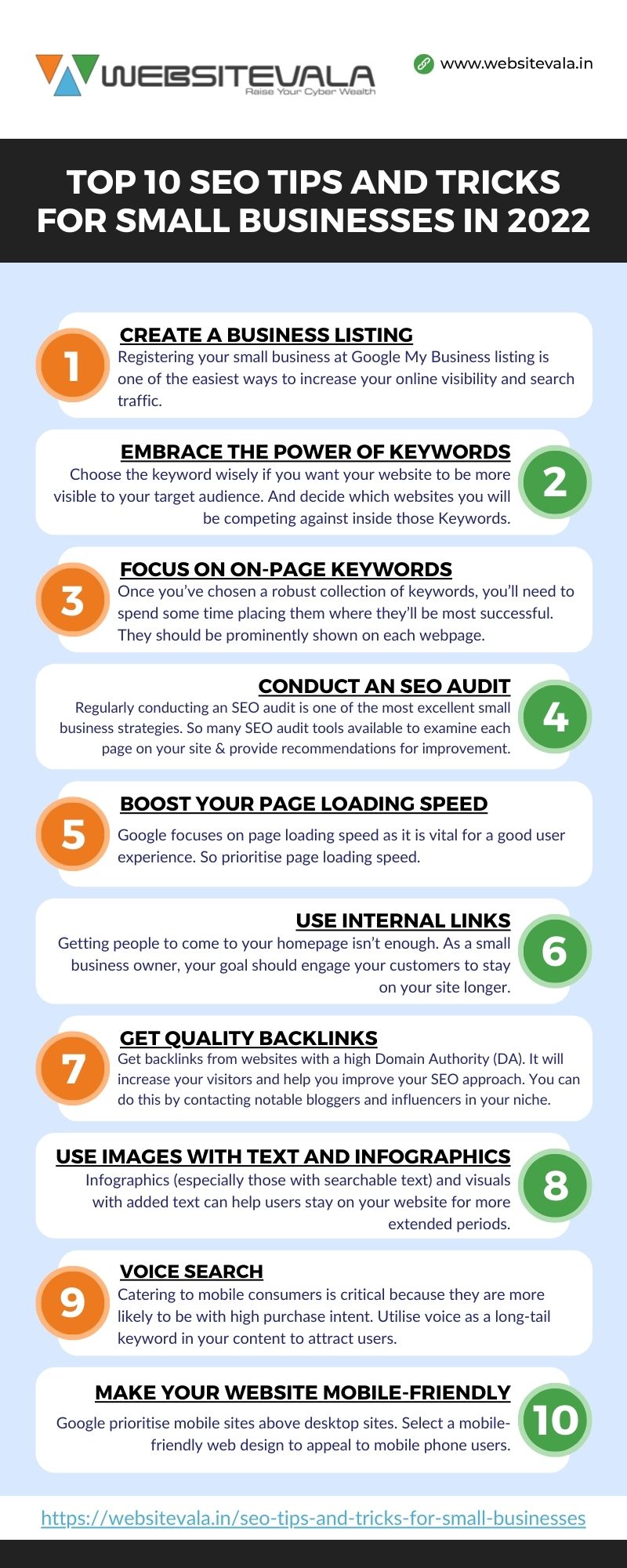Jump Directly to the Topic of Your Interest
ToggleFor small businesses, it’s essential to create brand awareness and visibility. Your company will not be able to expand if your clients don’t know about you. Search engine optimisation (SEO) is one of the most effective techniques to increase visibility and search traffic. And you should know some SEO tips and tricks to make your marketing efforts easy.
If you’re a small business owner, SEO can help you get new customers and take your firm to the next level by helping you develop a strong web presence and giving you an advantage over your competitors.
While SEO can produce excellent results, it necessitates a significant time investment. Fortunately, a few tricks can assist you in speeding up this time-consuming process.
Let’s look at some SEO tips and tricks for small businesses that can help you boost your brand’s growth.
1. Create A Business Listing
Registering your small business at Google My Business listing is one of the easiest ways to increase your online visibility and search traffic. It allows business owners to modify how their company appears on Google’s search engine results pages.
Google My Business listings assist search engines in finding the correct information about your company.
You can add contact information, location, and business address to your Google My Business Page. You can also use relevant photos to show your potential customers your products or office. It also allows you to write answers to frequently asked questions about your company.
Google My Business listings are beneficial for optimising your website for “near me” or voice-based searches. It is an important step to outrank your competitors in local search results.
2. Embrace the Power of Keywords
Keywords are the keystone of SEO, deciding what search terms you will rank for and which websites you will be competing against inside those rankings.
You must choose the keyword wisely if you want your website to be more visible to your target audience. You can use numerous keyword research tools to locate terms related to your business, receive a reasonable number of monthly searches, and are not overcrowded by your competitors.
3. Focus on On-Page Keywords
Once you’ve chosen a robust collection of keywords, you’ll need to spend some time placing them where they’ll be most successful. They should be prominently shown on each webpage, for example:
- Title tags
- Meta descriptions
- Heading tags
When using numerous keywords, try to group them in the text to maximise their SEO impact.
4. Conduct an SEO Audit
Although conducting an SEO audit is simple, most small firms fail to do so. As a result, regularly conducting an SEO audit is one of the most excellent small business strategies.
An SEO audit examines how well your website performs in search engine results pages and identifies areas where you can make improvements to help it rank higher. Many opportunities may be simple technical things like fixing broken links, improving page titles, and adding keywords in your meta descriptions.
There are numerous SEO audit tools available to examine each page on your site and provide recommendations for improvement. You can use either paid or free tools, but it is recommended to invest in a subscription-based tool that is more reliable and accurate.
5. Boost Your Page Loading Speed
Since 2010, Google has emphasised the importance of page loading speed in search engine optimisation. Furthermore, they indicated in 2018 that site speed was equally critical for mobile searches.
Google focuses on page loading speed as it is vital for a good user experience. When a mobile website takes longer than three seconds to load, 53% of consumers abandon it.
If you want clients to visit your website, you must prioritise page loading speed. Your site’s speed can be slowed by large graphics, inappropriate themes, or large embedded media.
6. Use Internal Links
Getting people to come to your homepage isn’t enough. As a small business owner, your goal should be to engage your customers to stay on your site longer.
Encourage them to read more of your content or check out more of your products. Internal links ensure that users are directed to other pages on your website. You indirectly improve your search engine optimisation by getting consumers to spend more time on your website. Average time on page, Dwell time, and bounce rate is important factors impacting your SEO for small business.
Internal links also assist in making your site structure more organised. They assist Google’s crawlers in understanding your content and establishing links between it.
7. Get Quality Backlinks
Your website, as a small business website, may be relatively new. Building enough authority, credibility, and organic traffic to appear in search results might take longer. However, there is an approach that can help you cut down on this time-consuming phase.
You can get backlinks from websites with a high Domain Authority (DA). It will increase your visitors and help you improve your SEO approach.
When you receive a backlink from a site with a high Domain Authority, search engines consider it a stamp of authority. Obtaining high-quality backlinks from various sources is the most effective strategy to improve your small business’s reputation.
You can do this by contacting notable bloggers and influencers in your niche. Some sites may even link back to your website without your knowledge if you’re lucky. But make sure that your website is not linked to any spammy website.
8. Use Images with Text and Infographics
User experience is a big deal in local SEO, and it’s usually quantified using things like bounce rates and session lengths. Infographics (especially those with searchable text) and visuals with added text can help users stay on your website for more extended periods.
They are also helpful in engaging customers who have an easier time processing graphic content than written material.
9. Voice Search
Voice search is a popular feature with a high volume of searches, particularly on mobile devices. Catering to mobile consumers is critical because they are more likely to be local users with high purchase intent.
Consider how an average user would express something in a voice search, and then utilise that sentence as a long-tail keyword in your content to attract those users.
10. Make your website mobile-friendly
Because eight out of ten users search the web on their smartphones, Google will prioritise mobile sites above desktop sites. As a result, it’s critical that your website runs quickly on mobile devices, displays effectively on small screens, and is thumb-tapping friendly.
The first step is to select a mobile-friendly web design to appeal to mobile phone users. When looking for a mobile-friendly website design, convenience and responsiveness should be at the top of your priority list.
Your website users won’t have to zoom in or out if you’ve optimised your content for mobile devices. An excellent mobile-friendly webpage is easily accessible on a variety of screens.
Final Thoughts on SEO tips and tricks for small businesses
SEO strategy for small businesses is a must-have to create an online presence. Follow the above-mentioned SEO advice for small businesses to make your website quick, robust, and user-friendly that ranks higher in search engines, bringing in more qualified potential consumers and increasing conversion rates.
SEO also allows building brand awareness for your firm as search engine users are more likely to trust a webpage on the first page of SERPs (search engine results pages) than firms that are not. As SEO strategies are ever-changing, you need to stay updated to remain ahead of your competitors.
For any help regarding applying these small business SEO tips and Tricks & ranking up your website Contact us at +91-8866860847 or info@websitevala.in.
Infographic
(Click on Infographic to enlarge)

MohammedTahir Patel is a Website Developer and Digital Marketing Consultant with 8+ years of experience in SEO, Local SEO, and online growth strategies. He specializes in building SEO-friendly WordPress websites, managing digital marketing campaigns, and helping small businesses grow their online presence. Passionate about technology and automation, MohammedTahir combines creativity with technical expertise to deliver results that matter.







